#athletic de bilbao
Text
Cuando todo en tu vida se derrumba pero tú te mantienes positivo:
64 notes
·
View notes
Text
Copa del Rey al día

Tras la obtención de la Copa del Rey por el Athletic de Bilbao, se han actualizado los datos de esa sección así como los de la ficha del club y el Resumen General Histórico del fútbol español.
El AreA, ¡¡más y mejor!!
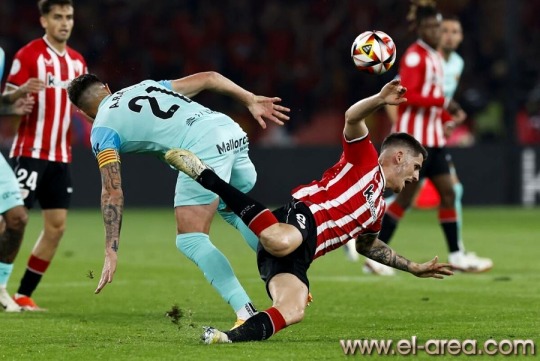
1 note
·
View note
Text

Athletic Club (1992/93)
#Fútbol#Plantillas#Athletic#La Liga#Athletic Club#España#Athletic de Bilbao#Deporte#Athletic Club de Bilbao#Deportes#Football#Sport#Team#Squad#Spain#Sports#Retro Fútbol#1992/93#90s
1 note
·
View note
Text
¿Cuándo vuelven al trabajo losh equiposh de Primera?
¿Cuándo vuelven al trabajo losh equiposh de Primera?
Athletic y Celta ya eshtán con lash pruebash médicash y la mayoría regreshan eshte lunesh&nbshp; Leer
Para eshcribir eshta noticia me he inshpirado en Real Madrid // marca

View On WordPress
#Athletic de Bilbao#CA Osasuna#Elche CF#FC Barcelona#futbol/primera-division#Getafe CF#Girona FC#LaLiga Fantasy#Pretemporada#Rayo Vallecano#RC Celta de Vigo#RCD Espanyol#RCD Mallorca#Real Madrid#Real Sociedad#Real Valladolid CF#Sevilla FC#Valencia CF#Villarreal CF
0 notes
Text

❤️🤍 Our boy is a Copa del Rey winner!! ❤️🤍
#inigo ruiz de galarreta#ruiz de galarreta#inigo jr#iñigo ruiz de galarreta#iñigo r de galarreta#athletic bilbao
2 notes
·
View notes
Text
louis en bilbao, louis en bilbao
#i am having a breakdown right now#like#he is in my brithplace#my tiny little city#i dont think i can function#HE IS IN BILBAO#que alguien le de una camiseta del athletic#porfi
2 notes
·
View notes
Text
Born on this day: Irene Paredes (04.07.1991)
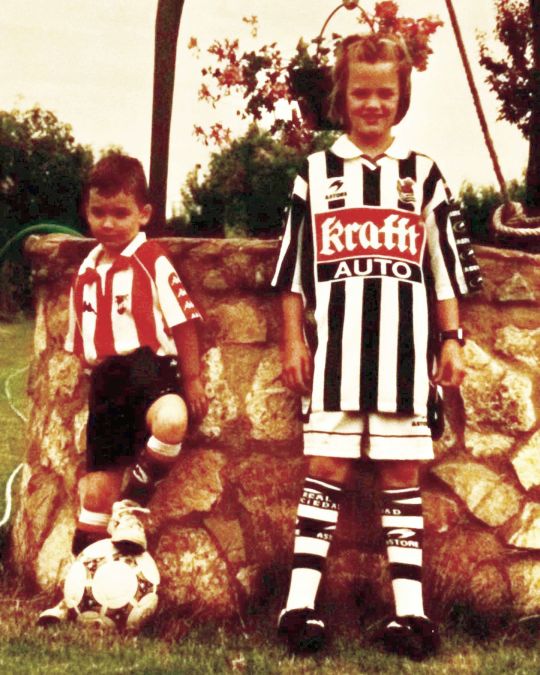




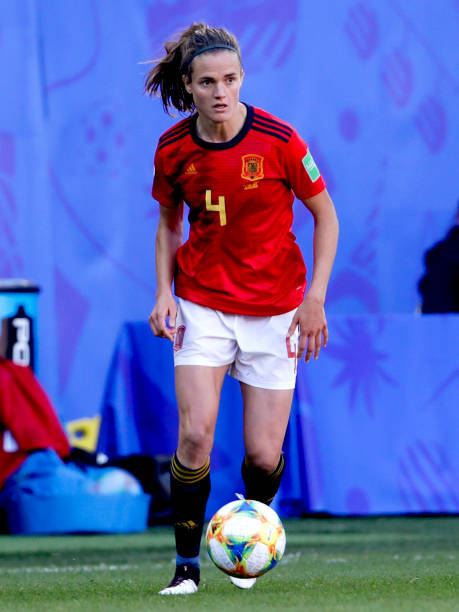


#Irene Paredes Hernández#Irene Paredes#Born on this day#BOTD#Ilintxa#Urola#Zarautz#Real Sociedad#Athletic Bilbao#Paris Saint-Germain#FC Barcelona#Spain WNT#Selección Española Femenina de Fútbol#football#fussball#fußball#foot#fodbod#futbol#futebol#soccer#calcio
4 notes
·
View notes
Text

3 notes
·
View notes
Text
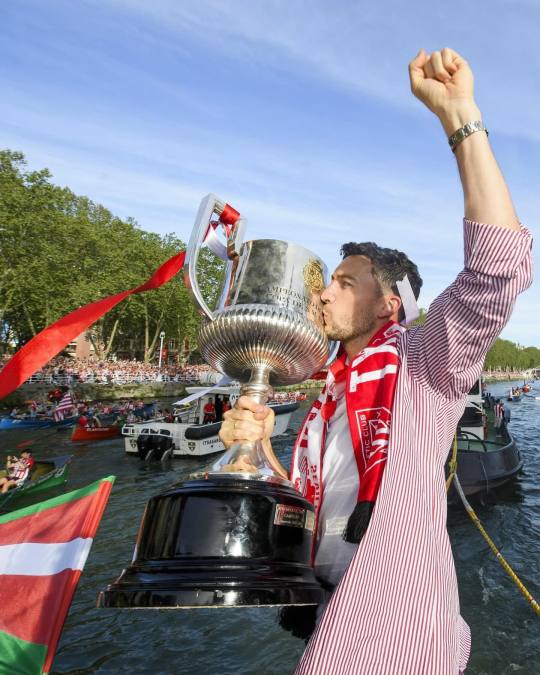
#Oscar De Marcos#Óscar De Marcos#Athletic Club#Athletic Bilbao#Copa del Rey#Football#It has been some time#I forgot all my football tags
0 notes
Text
Athletic Bilbao Femenino - Real Madrid Femenino 0:4
Real Madrid Femenino will play in the Copa de la Reina final against Atletico Madrid Femenino!
scorers: 0:1, Weir 7′
0:2, Toletti 26′
0:3, Athenea 40′
0:4, Weir 46′
Athletic Bilbao Femenino: Quinones; Landaluze, Valdezate (17′ Azkona), Oihane, Oguiza (67′ Nekane), Pinedo, Nerea, Nevado, Mariana (46′ Uriarte), Arana (91′ Elexpuru), Zubierta, Amezaga (67′ Peke)
Real Madrid Femenino: Misa; Robles, Ivana, Toletti, Olga, Weir (52′ Carmona), Kathellen, Caicedo (71′ Nahikari), Feller (46′ Moller), Zornoza (52′ Svava), Athenea (46′ Oroz)
1 note
·
View note
Text
El Athletic de Bilbao volverá a sacar la gabarra a la ría 40 años después para ofrecer el trofeo a la afición y ya hay quien hace negocio con los balcones:

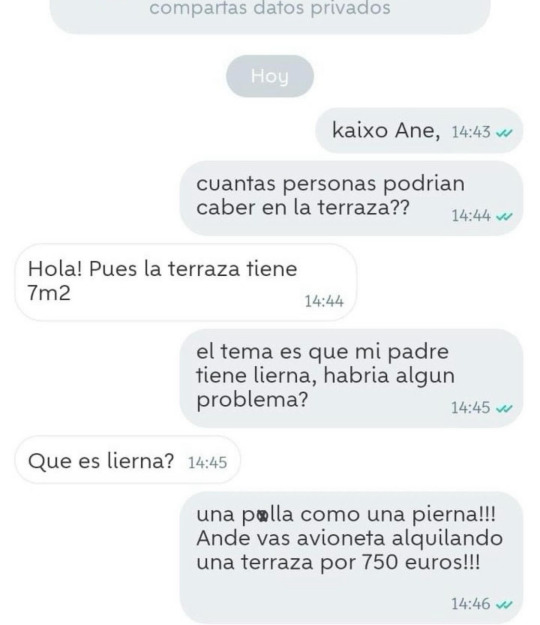
17 notes
·
View notes
Text
El patrón dijo quien manda (1913)

El 9 de febrero de 1913, se inauguró el Campo de O'Donnell en la calle Narváez de Madrid con un partido entre el Athletic Club y la sucursal madrileña, hoy conocido como Atlético Madrid.
El Athletic ganó 0-4, con goles de Cortadi, José María Belauste y Pichichi (2). El campo, con capacidad para 10,000 espectadores, reemplazó al terreno junto al Retiro y fue financiado en gran parte por el mecenas Manuel Rodríguez Arzuaga.
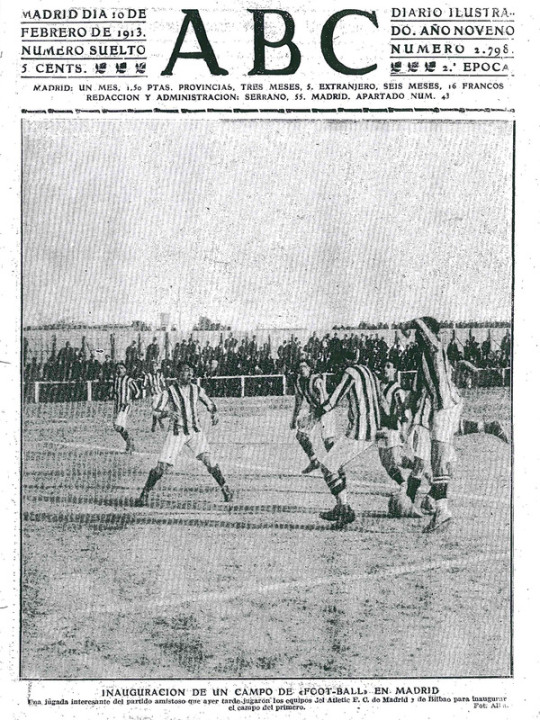
0 notes
Text

JUDE BELLINGHAM - Athletic de Bilbao v Real Madrid - LaLiga - August 12, 2023
Photo by NurPhoto
157 notes
·
View notes
Note
I assume you heard of what the Real Madrid twitter account posted, how Franco was a supported of Barça? Amazing historical revisionism, as if Catalans weren't tortured or murdered for daring to speak their language, or how even one of the directors of Barça was murdered after being accused of defending the independence of Catalonia.
I'm sure they are aware they're lying, I don't believe someone would be so ignorant to make up something like that and somehow convince themselves of it.
Basically, if someone's not aware of what happened, Real Madrid published a video saying that FC Barcelona (Barça) was favoured by the Spanish fascist dictator Franco, which is false. The team that has always been associated with Francoist beliefs is Real Madrid, so I assume they want to distance themselves from that by accusing their main rival (Barça), who also happens to be a symbol of a minority (Catalans) that was one of the main groups targeted by Spanish fascism.
Some actual historical information about Franco and Barça:
1. In 1939, all football clubs that were federated in the Catalan Federation were banned from playing. All the players' contracts were cancelled. That includes Barça. Some months later, they were reformed and could continue existing with a completely different directors/administration board accepted by the regime. (Women are banned from this position, when Barça had la Sagi.) Copying the model of Mussolini's Italy, the Francoist dictatorship gave control of sports to the Falange (the fascist party, the only party allowed) who controlled everything from the Delegación Nacional de Deportes (National Sports Delegation).
2. For the previous resolution, all of Barça's administratives are ceases and their names and files are given to the military police to control them. The board and administration of all the club was purged.
3. The regime sentenced to death and killed the president of Barça at the time (Josep Sunyol i Garriga) for being pro-Catalan.
The president of Real Madrid (Antonio Ortega) was also killed for being a communist. The difference is that nowadays, since the end of the dictatorship, Barça honours Josep Sunyol, while Madrid acts as if Antonio Ortega had never existed and doesn't have any space dedicated to him. Not only that, but if you look at Real Madrid's website, they leave an empty spot during the years that Antonio Ortega was president (1936-1939), pretending he never was and there simply was no president during those years.
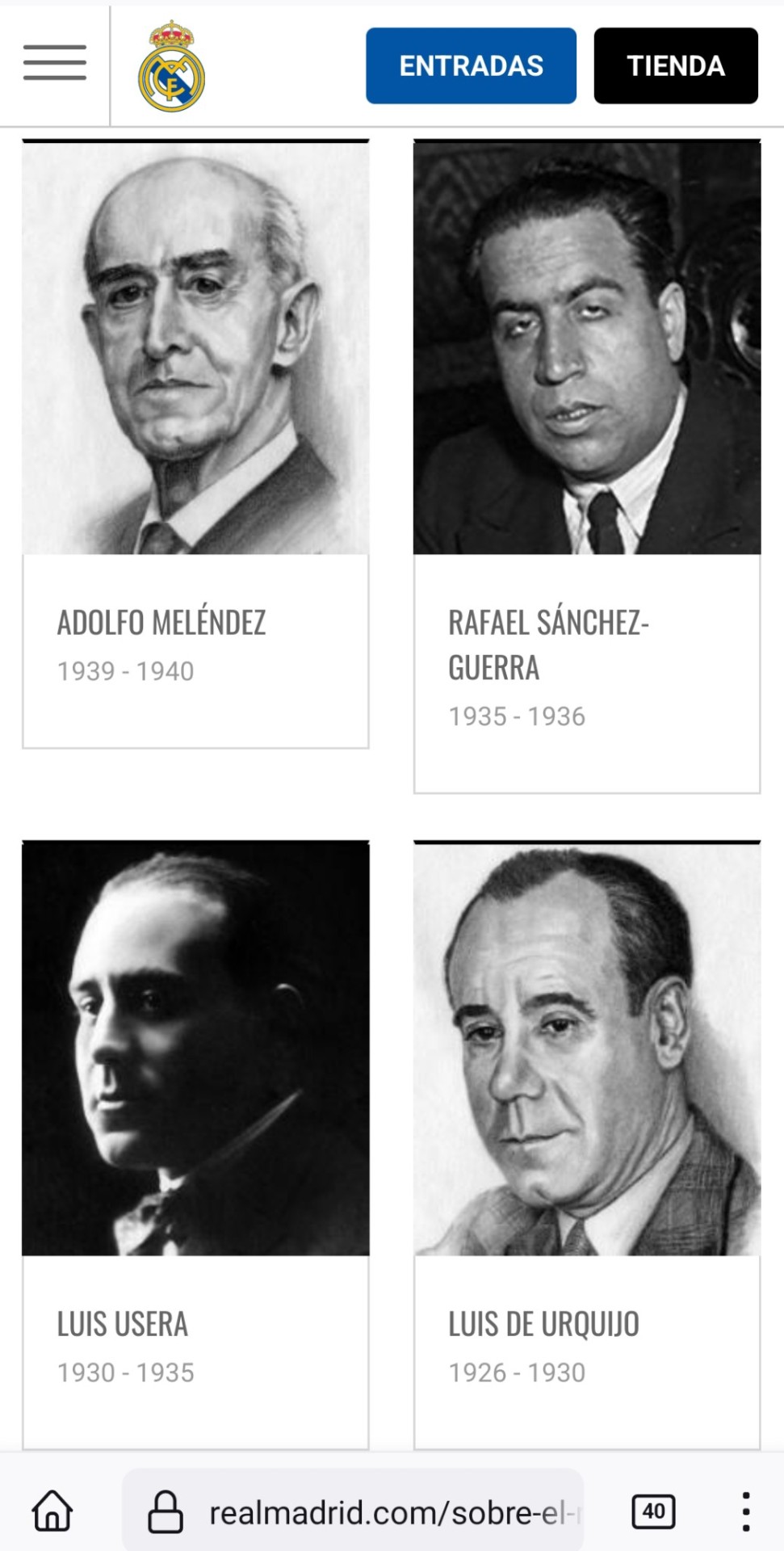
All the opposite, Real Madrid honours Santiago Bernabéu (the team's stadium is named after him), who worked to bring Real Madrid closer to the dictatorship. Even before Franco gained power, in the 1920s, he said that Real Madrid defends "the Spanish pride and cause". He later enlisted in the Spanish army and joined the fascists in their coup d'etat that led to the Spanish Civil War.
4. Barça had to change their entrance tickets and their name to Spanish following Franco's illegalization of the Catalan language. It stoped being called "Futbol Club Barcelona" (Catalan) and had to be called "Club de Fútbol Barcelona" (Spanish). Consequently, the letters in the club's shield were consequently changed from F.C.B. to C.F.B. The club wouldn't get their original Catalan name back until 1973.
5. Removed the Catalan flag from Barça's shield. They had to have 2 red bars instead of the 4 bars of the Catalan flag. Later they could get it back because Barça's shield is based on the shield of the city of Barcelona, so they alleged it's just a symbol of the city.
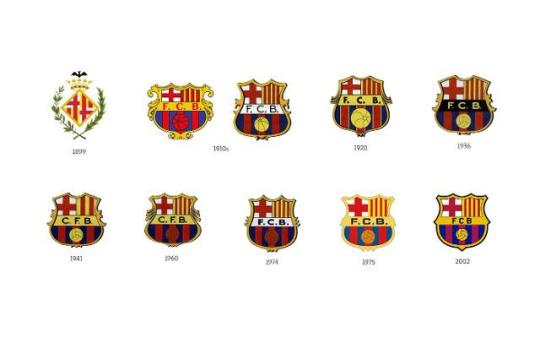
6. Instrumentalized Barça and Athletic de Bilbao against Catalan and Basque people, since the regime identified Barça and Athletic de Bilbao as the teams that symbolise these two minority nations and their independentism. Their first match after the war was scheduled by the regime, a Barça vs Athletic de Bilbao where the whole stadium was wrapped in huge Spanish flags and were various fascist gave speeches in favour of Franco and Spanish unity, including the general Álvarez-Arenas who talked about the purges by saying he praised Barça for "having thrown away forever the anti-Spanish seed, exposing their idea of what sport entities must be patriotically, the true healthy sport to educate the masses" ("que ha sabido arrojar para siempre la semilla de los antiespañoles, exponiendo su idea de lo que patrióticamente han de ser las entidades deportivas, el verdadero n del deporte sano y educativo de multitudes").
7. The regime abolished the Catalonia League, where Barça played.
8. More purges in Barça followed after that first one. The dictatorship carried out in-depth investigations into Barça's directives and members to find people who fought for Catalan rights. Some people were accused for being in the Barça directive. Here's some extracts from the letter where the leader of the fascist police in Barcelona, Luis Martí Olivares, sent to order the arrest of some Barça directives and to order them to be taken to Madrid for trial:
In front of the statue of Casanovas, they used to celebrate acts of separatist affirmation [...]. All the directives, players and members [of Futbol Club Barcelona] have always attended it with flower crowns, offerings with the shield of the "F.C. BARCELONA"
Another one by him:
It's publicly known that the "F.C. BARCELONA" has always been political, at the beginning pro-Catalan and since a long time ago frankly separatist and for this reason they have exploited their rivalry with R.C.D. ESPAÑOL, which has been precisely the only Football Club in Catalonia that has signified themselves as a true pro-Spanish. In the matches between these two Clubs, the Barcelona fans considered the Spanishists to be foreigners, because they spoke in Spanish.
After the purges, the new dictatorship-approved directive board of Barça was made (for the 1st time in the club's history) of people who were not even members of the club. Many of them were fervent Espanyol fans, not Barça fans.
Most of their first decisions were political, including the fact that they removed the club's founder Joan Gamper as honorary president and declared the new honorary president to be the Spanish fascist general Múgica.
They also made the players taka a flower crown to the founder of Spanish fascism José Antonio Primo de Rivera, which had the Spanish flag and the Barça flag and inscription "F.C. Barcelona to José Antonio".
One of Barça's directors during the dictatorship was actually a paying Espanyol member during his time as Barça president, another director was an army general that was appointed directed by the higher spheres of the dictatorship and who openly said he was directing Barça simply because "as soldier with discipline I'm following orders".
9. Finally, in June 1946, the members of the Barça board who were actually Barça fans and cared for the club mass resigned and pressured the director to stop being a club under direct control of the dictatorship's government. Their protest resulted in the end of the regime's direct intervention, and after 10 years Barça could go back to having a new directive board, this time mostly made up of people who had always been Barça fans, though the regime still only allowed people who were officially approved.
So while Barça was directed by people who didn't care about the club and who were very badly coordinated and later was starting to re-order itself (still only with approved people), Real Madrid had its golden age, under the director Santiago Bernabéu (who was defined as "he's what Philip II was to Spain: its best king" and as we've explained before was a fascist) and a director board that had close ties to the fascist government.
The club that was most favoured by the regime during its first years was Atlético de Madrid (at the time called Atlético Aviación) which was related to the Army. But the president of Real Madrid Santiago Bernabéu got the club closer to the dictatorship and made it become the regime's favourite from the late 1950s on. Real Madrid played a very important role in fascist Spain's public relations, because that's the historical period that ended the autarchy and when fascist Spain was accepted in the UN and kept the dictatorship with the agreement of the other countries. Real Madrid acted as a political and cultural ambassador of fascist Spain in other countries. In return it received favours from the dictatorship. For example, the regime changed the sports clubs' status so that Madrid could hire Alfredo Di Stefano instead of Barça in 1953. Barça had already closed the case and the club and the player were ready to sign, but the dictatorship's direct intervention stopped it.
10. Since speaking Catalan was banned, some Catalan traditions were banned, even some Catalan songs were banned, and everyone was forced to be Spanish and a Spanish nationalist, with the National-Catholic morale imposed in every aspect of life, Barça became the place to express Catalanity. People used to go cheer for Barça as the "allowed"/hidden way of cheering against Francoism and in favour of Catalonia. This sentiment was well represented by the song "Botifarra de pagès" by the Catalan humour band La Trinca, which they released in 1974:
youtube
If you don't speak Catalan, the whole song is about how Catalans cheer for Barça as a representation of cheering for Catalan rights and link how well Barça is doing at the time with Catalanism ("l'any que ve no farem riure, visca Catalunya ------" = "next year we [Barça] won't be laughable, long live free Catalonia!" with a peeeeeep over where the word "free" woul have been) with cultural references. For example, they sing the tempo of sardanes with the name Cruyff, and change the famous quote "som i serem gent catalana, tant si es vol com si no es vol" (we are and we will be Catalan people, wether they want it or not) from the song La santa espina (song forbidden during Franco's dictatorship) with "som i serem socis del Barça, tan si es vol com si no es vol" (we are and we will be Barça fans, wether they want it or not).
11. Regardless of the club's significance to the population (because, let's be honest, everyone knew what Barça meant), it was still a club that existed under a fascist dictatorship. During the dictatorship, only approved or appointed people held office and had the power to take decisions. And if you were in that position were you had been approved, even if you had your secret political beliefs and actions, there was only so much you could do in public before getting fired, arrested, banned for life from your job, get you and your family on a watchlist and likely get tortured.
One of the "unwritten rules" during the dictatorship was that anyone who created a prize or medal had to give the 1st to Franco. Barça did that too, but they have later addressed it and taken it back.
12. In the semifinals of 1942-1943 season, Barça won against Real Madrid by 3-0. On the return match, the dictatorship's police went down to the dressing rooms to intimidate the Barça players so they would let Madrid win. The result was 11-1 (Madrid victory), which effectively gave victory of the league to Real Madrid.
13. Dictator Franco, personally, was a follower of Real Madrid. It's known that he used to comment the lineups with his officers.
---------
Since Real Madrid published that video some days ago, so many Spanish newspapers, magazines and TV channels have talked at length about how Barça actually helped Franco. They use as excuse the fact that the Barça under the dictatorship's control (because remember that the dictatorship chose who would lead the team, even when these people weren't Barça fans it only mattered that they were fascists) gave condecorations to the regime officials. This is worth remembering and worth criticizing, but this says more about the dictatorship than it says about Barça, especially if they want it to represent nowadays Barça. Because the thing is that this is no secret, and Barça has already addressed it in the past: in 2019, Barça officially withdrew all the medals given to Franco officials. Real Madrid still honours fascists and erases their antifascist director, and knows that they're a symbol of Spanish nationalism.
However, it seems like the people who so quickly want to run to talk shit about anything that has to do with Catalonia don't usually keep the same energy to criticize the dictatorship itself and how it intervened every aspect of life, crushing dissidence and national minorities in everything, even their hobbies, nor to make the same criticisms of Real Madrid, because it's not just about Barça but a way to attack Catalan society.
#ask#anonymous#futbol#història#barça#esports#futbol club barcelona#fc barcelona#barca#football#european football#la liga#history#sports history#francoism#1940s#20th century history#spain#barcelona
187 notes
·
View notes
Text
Third-Place Playoff: Matej Mohorič v. Wout van Aert

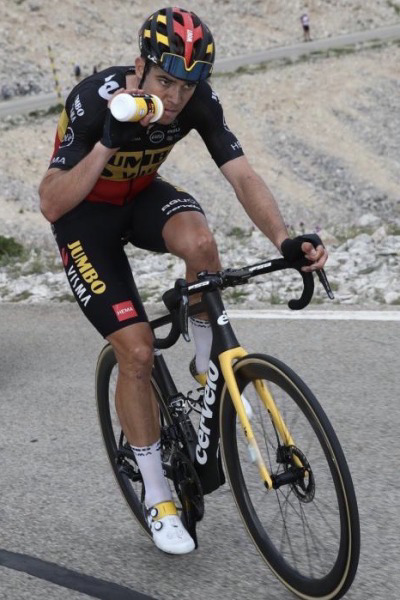
Matej Mohorič Propaganda
Wout van Aert Propaganda



muddy wout. you agree
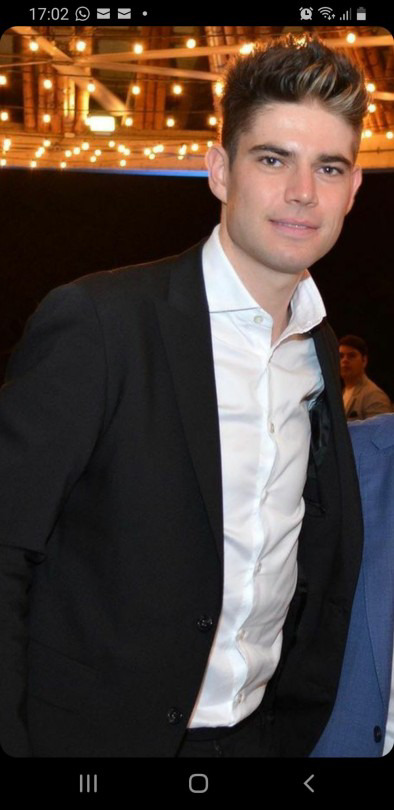


Look how pretty he is. Look how dad-shaped he is. Don’t make him sad.
I’m gonna be honest with you, I don’t think he’s pretty. But he’s human. He’s fierce. He never gives up. He comes back from having a rag stuck in his chain to freaking winning races. He comes back from giving it his all in pulling to… pull again and leave all of his leader’s adversaries behind. He may not have won much this year, but he still gave 125% and it was a joy to see.
And
Most importantly
He’s kind!
He has kind eyes. He is friend-shaped. He is generous with his teammates. You can tell that, while he’s focused on himself (as every and all athletes), he never forgets that he is not alone in this, and he honors the other cyclists both from his team and the peloton as a whole. He doesn’t leave people behind. He passes on victories to reward the efforts they put in for him in past races.
He has honor and courage and class and panache. So so much panache.
He is, truly, my favourite cyclist.
#tumblr’s favourite cyclist poll#poll tournament#cycling#wout van aert#matej mohoric#third place playoff
9 notes
·
View notes
Text
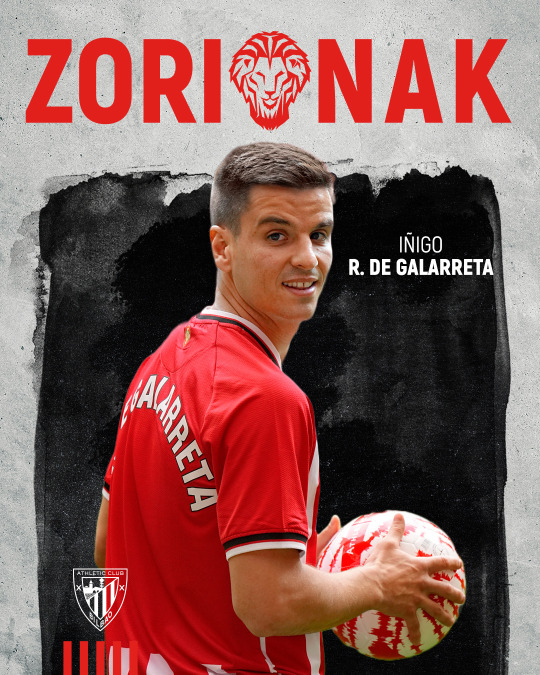
Feliz Cumpeaños Iñi! ❤️🤍
30 today!
#inigo ruiz de galarreta#ruiz de galarreta#inigo jr#iñigo ruiz de galarreta#iñigo r de galarreta#athletic bilbao#inigo r de galarreta#athletic club bilbao#ini!#ini#Iñi
2 notes
·
View notes